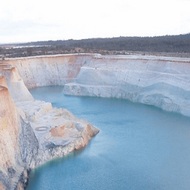Research database will be first of its kind in WA.
| Date: | Friday, 06 March 2020 |
|---|
The ChemCentre is seeking to collaborate with mining companies to build a more comprehensive database of the water quality in Western Australia’s (WA) mine pit lakes.
The Mine Pit Lakes – their Characterisation and Assessment for In-Situ Metal Recovery Opportunities and Cost-Effective Environmental Management study is a three-year project led by ChemCentre in collaboration with the CSIRO, the Department of Mines, Industry Regulation and Safety (DMIRS) and the Department of Water and Environmental Regulation (DWER).
The project focuses on Western Australian ‘in-the-field’ contemporary mine pit lakes, to provide a ‘time capsule’ picture of how future similar systems are likely to behave.
Encompassing all mining commodities in WA, the study will provide industry and government with tools to inform policy and guidance for mine planning, and address knowledge gaps related to prediction of future pit lake water quality. Early risk identification and better informed environmental impact assessments, operations, mining plans and waste rock management will reduce associated whole-of-life mining operational costs and increase economic benefits.
The project is also investigating the potential use of novel processes to recover valuable metals from pit lakes’ systems.
To date, data from 13 mine pit lakes have been added to the database. In order to identify temperature or salinity induced stratification, the water quality of each mine pit lake has been measured throughout the water column, and this has already shown quite dramatic differences between surface water and water at the bottom for some pit lakes.
The dataset is now being used to better understand pit lake geochemistry and undertake water quality and environmental risk assessments.
The research, which forms part of a project funded by the Cooperative Research Centre for Contamination Assessment and Remediation of the Environment (CRC CARE) and the Minerals Research Institute of Western Australia (MRIWA), includes pit lakes of a variety of ages, geological and environmental conditions.
For more information, or to discuss participation in the study, please contact Dr Silvia Black sblack@chemcentre.wa.gov.au or Dr Kathryn Linge klinge@chemcentre.wa.gov.au

